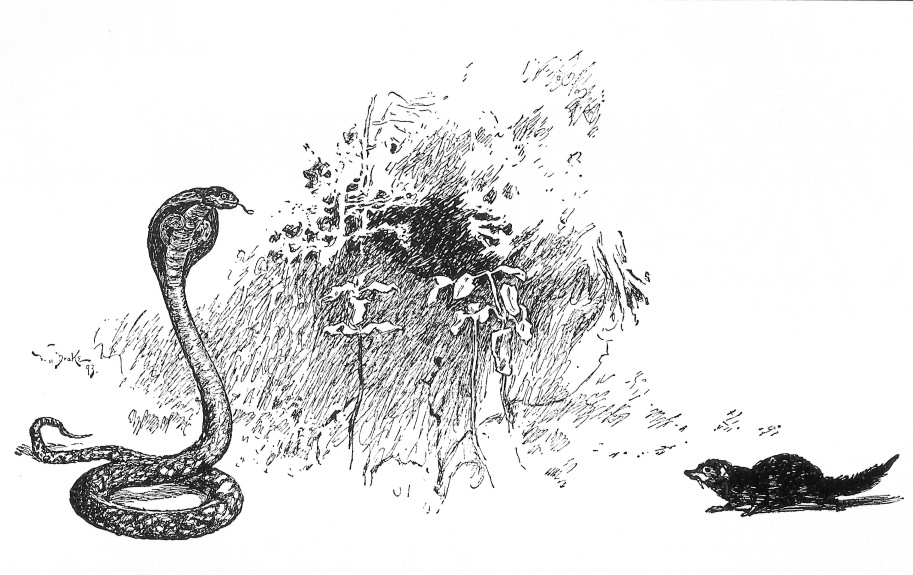Read the previous part here…
One should always think before acting, and never reach a conclusion without examining all the facts. Else, it would lead to a lot of regret, like in the case of the Brahmin lady and the mongoose.
ManiBhadra said “How did that happen?”
The judge replied…

ब्राह्मणीनकुलकथा
The story of the Brahmin lady and the mongoose
In a village, not so far away from here, lived a Brahmin named DevaSharma. He lived with his wife and their pet mongoose in a small house, and made his living from working at the nearby temple.
One year, his wife gave birth to a baby boy, and incidentally, the same day, their mongoose also gave birth to a baby, but unfortunately died in the process. The wife felt compassionate towards the baby mongoose, and started to take care of it like her son. She treated them equally – bathed and fed them, told them stories and rocked them to sleep. She did not show any disparity in affection towards the mongoose, but within her heart, she still did not trust it completely. It was a wild animal after all, she thought to herself. Her overpowering love for her son also made her fear that some day the mongoose may bring harm to the little one. it is said…
कुपुत्रो ऽपि भवेत् पुंसां हृदयानन्द-कारकः ।
दुर्विनीतः कुरूपो ऽपि मूर्खो ऽपि व्यसनी खलः ॥ १८ ॥
kuputro ‘pi bhavet puṃsāṃ hṛdayānanda-kārakaḥ |
durvinītaḥ kurūpo ‘pi mūrkho ‘pi vyasanī khalaḥ || 18 ||
A child is always dear to his parents, however impolite, ugly, foolish, lecherous or deceitful he may be.
Even if he is worthless, he is priceless to his parents.
एवं च भाषते लोकश् चन्दनं किल शीतलम् ।
पुत्र-गात्रस्य संस्पर्शश् चन्दनाद् अतिरिच्यते ॥ १९ ॥
evaṃ ca bhāṣate lokaś candanaṃ kila śītalam |
putra-gātrasya saṃsparśaś candanād atiricyate || 19 ||
The world claims that sandalwood paste is very cooling, but nothing compared to the the touch of one’s own son, which is more cooling and calming.
सौहृदस्य न वाञ्छन्ति जनकस्य हितस्य च ।
लोकाः प्रपालकस्यापि यथा पुत्रस्य बन्धनम् ॥ २० ॥
sauhṛdasya na vāñchanti janakasya hitasya ca |
lokāḥ prapālakasyāpi yathā putrasya bandhanam || 20 ||
People are not so closely bound in other relationships – friends, parents, well-wishers or guardians – as much as they are bound to their children.
They may find fault with the closest of friends or even parents, but not as much in their own children, such is the bond of parenthood.
One morning, as the Brahmin lady set out to fetch water from the village well, she called out to DevaSharma. “I will be back soon, my dear. Please look after the baby, and see that the mongoose does not harm him.”
DevaSharma, who was engrossed in prayer, didn’t hear her. He too set out to the temple after a few minutes.
In the meantime, a huge black snake crawled up to the hut, and close to where the baby lay. The mongoose, who was resting nearby, saw the snake, and by instinct, pounced on the snake as it crawled towards the baby. A tough fight ensued, but in the end, the mongoose bit the snake and tore it to pieces.
As it moved away from the baby, the mongoose heard the Brahmin’s wife returning home. Excited by it’s victory over the snake, it rushed to the door, keen to get a hug from his ‘mother’.
The Brahmin’s wife noticed the mongoose waiting at the doorstep…with blood on it’s face.
Horrified at the sight, she immediately thought that the mongoose had killed her son. “Oh you wicked animal…what have you done!” she screamed as she threw the pot of water at the mongoose in rage. The poor mongoose died on the spot.
The Brahmin lady rushed past the dead mongoose, crying and lamenting, when she stopped in her tracks. Her baby was alive, on the cot, smiling playfully. A few meters from the bed, lay the corpse of the dead snake.
She realized what had happened. Overcome with grief at her folly, she cradled the body of the dead mongoose in her arms, crying loudly in regret.
DevaSharma returned in the evening, to find his wife sitting on the floor, the dead mongoose in her lap. “You didn’t listen to me”, she said crying. “You had to go for work even today, leaving our children alone. Now see the consequences. You are to blame for the death of my (animal) son. It is said…
अतिलोभो न कर्तव्यः कर्तव्यस् तु प्रमाणतः ।
अतिलोभज-दोषेण जम्बुको निधनं गतः ॥ २१ ॥
atilobho na kartavyaḥ kartavyas tu pramāṇataḥ |
atilobhaja-doṣeṇa jambuko nidhanaṃ gataḥ || 21 ||
One should not give up greed, but one should not be too greedy as well. The wheel whirled on the head of the person who was the most greedy.
DevaSharma said “How did that happen?”
His wife replied…
to be continued…
